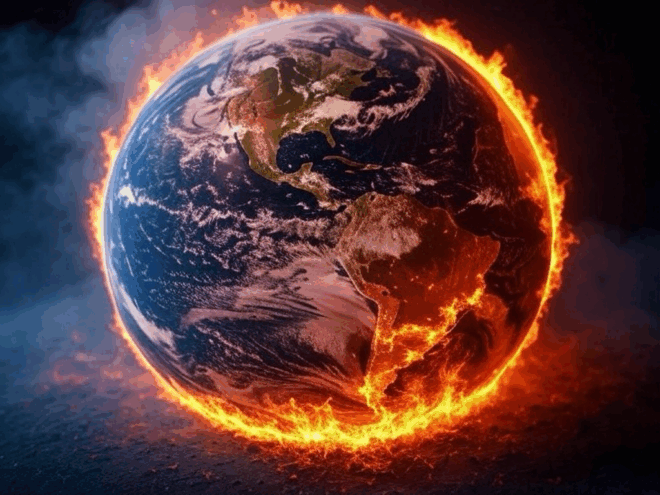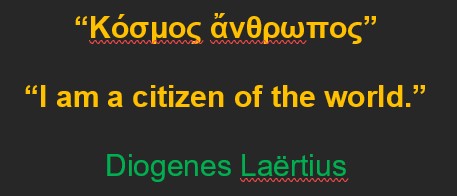

Dylan Thomas’s poem “Do Not Go Gentle into That Good Night”, serves as a powerful lament against the inevitability of death, urging us to resist the encroaching darkness with unwavering strength. The poem’s central metaphor – “rage against the dying of the light” – holds a profound resonance when applied to the current state of humanity. If we are indeed in our twilight years, as suggested by the escalating crises of war, political extremism and environmental collapse, then humanity is far from slipping quietly into oblivion. Instead, we find ourselves entrenched in a chaotic, often self-destructive struggle to persist, characterised by global conflicts, the rise of authoritarian regimes, and a refusal to confront the existential threat of climate change.
This exploration delves into these manifold crises, arguing that humanity’s defiance – while chaotic and frequently misguided – reflects a species unwilling to go gently into its good night. By examining global warfare, the resurgence of far-right strongmen and the looming climate catastrophe, we observe a world that is not merely clinging to life but raging against its own mortality, struggling to channel that rage into a sustainable future.
A World at War with Itself
The global landscape is marred by conflict, both overt and covert, as nations, ideologies and interests collide with devastating outcomes. The United States, with its staggering $1 trillion defence budget, embodies a paradox that underscores the world’s belligerent undercurrents. Officially at war with no one, the US is unofficially entangled in conflicts spanning the globe, from the Middle East to Eastern Europe. Through proxy wars, drone strikes, economic sanctions, and covert operations, the US exerts its influence in ways that often destabilise rather than stabilise.
In Syria and Iraq, American military presence fuels anti-Western sentiment; in Yemen, US-backed Saudi operations have contributed to a humanitarian catastrophe. The military-industrial complex thrives on this state of perpetual readiness, ensuring that peace remains an elusive ideal. This shadow warfare, conducted under the guise of national security, reveals a nation not at rest but braced for confrontation, its actions rippling across the world to provoke resentment and resistance.
Elsewhere, open conflicts starkly illustrate humanity’s capacity for destruction and the international community’s failure to intervene effectively. Israel’s military campaign in Gaza, described by many as a live-streamed genocide, unfolds with harrowing visibility on social media and news outlets. The bombardment of civilian infrastructure, the staggering death toll, and the displacement of millions paint a grim picture of modern warfare’s brutality. Yet, the global response is marked by inertia, selective outrage and complicity. Western powers, including the US and European nations, provide Israel with diplomatic cover and military aid, while condemnations from the Global South are often dismissed as posturing. This paralysis reflects a deeper malaise: a global order that prioritises geopolitical strategy over human lives. The United Nations, established to prevent such atrocities, is hamstrung by vetoes and competing interests, rendering it a bystander to the carnage.
The war in Sudan rages with equal ferocity but receives far less attention. The conflict between the Sudanese Armed Forces and the Rapid Support Forces has displaced over 10 million people and killed tens of thousands, yet it remains a footnote in global discourse. This disparity in attention – Gaza’s visibility versus Sudan’s obscurity – highlights the selective empathy of the international community, where strategic interests and media coverage dictate which lives matter. In Ukraine, the grinding war against Russia continues to reshape global alliances, economies, and energy markets. The conflict, now in its third year, has become a proxy battleground for NATO and Russia, with devastating consequences for Ukrainian civilians caught in the crossfire. The spectre of escalation looms large, as both sides wield nuclear rhetoric to assert dominance.
Tensions between India and Pakistan, two nuclear-armed neighbours, further underscore the fragility of global peace. Decades of animosity over Kashmir, coupled with recent political posturing, have brought the two nations to the brink of conflict. A miscalculation could trigger a catastrophe with global repercussions, given the region’s strategic importance and the potential for nuclear escalation. Israel’s belligerent rhetoric toward its neighbours – Lebanon, Syria, and Iran – adds another layer of instability to the Middle East, where proxy wars and sectarian divides already fuel chaos. China’s territorial claims in the South China Sea, rooted in historical assertions, but contested by nations like Vietnam and the Philippines, provoke unease in the Asia-Pacific, where naval standoffs and economic pressures threaten to ignite broader conflict.
These conflicts, disparate in their origins, share a common thread: they are symptoms of a world unable to reconcile competing visions of power, identity, and survival. The early 20th century saw two world wars – 1914 – 1918, touted as the “war to end all wars,” and 1939 – 1945, a cataclysm aimed at extinguishing the scourge of totalitarian fascism. The first war, fought in trenches and marked by unprecedented slaughter, was intended to usher in a new era of peace. Instead, it sowed the seeds of economic despair and resentment that fuelled the rise of Hitler and the Second World War. The defeat of Nazi Germany and its allies was heralded as the triumph of democracy over tyranny, yet the mechanisms established to prevent such horrors – international institutions like the United Nations – have proven inadequate in the face of modern challenges. Humanity has not laid down its arms but has instead refined its methods of warfare, from tanks to drones, from propaganda to cyberattacks. The wars of today, while less global in scope than those of the 20th century, are no less destructive in their human toll, reflecting a species that refuses to go gently but struggles to find a path to peace.
The Resurgence of Authoritarian Strongmen
If war is one face of humanity’s refusal to fade quietly, the rise of authoritarianism is another, casting long shadows over the democratic ideals that emerged from the ashes of World War II. The post-war era was meant to herald the triumph of liberal democracy, with institutions designed to safeguard freedom and prevent the return of fascism. Yet, the 21st century has witnessed a resurgence of far-right strongmen who echo the demagogues of the past, exploiting fear, division, and disillusionment to consolidate power.
In the United States, the MAGA movement, led by Donald Trump, has galvanised a base frustrated with globalisation, immigration, and institutional elites. Trump’s rhetoric – nationalist, divisive, and often conspiratorial – flirts with autocracy, undermining democratic norms through attacks on the media, judiciary, and electoral processes. The January 6, 2021, Capitol insurrection, fuelled by his claims of a stolen election, was a stark reminder of how fragile democracy can be when charismatic leaders stoke unrest.
In Russia, Vladimir Putin’s iron grip on power, maintained through propaganda, censorship, and the elimination of opposition, fuels imperial ambitions. The invasion of Ukraine, justified by a revisionist narrative of Russian greatness, reflects Putin’s vision of a world where might trumps right. His regime’s suppression of dissent, from the poisoning of Alexei Navalny to the jailing of journalists, mirrors the tactics of totalitarian regimes past. In Israel, Benjamin Netanyahu’s hardline policies and consolidation of power reflect a similar trend. Facing corruption charges and political challenges, Netanyahu has leaned into ultra-nationalism, aligning with far-right factions to maintain his grip on power. His government’s actions in Gaza and the West Bank, coupled with inflammatory rhetoric toward regional neighbours, prioritise political survival over ethical governance.
This pattern repeats across the globe. In Hungary, Viktor Orbán has dismantled democratic checks and balances, rewriting the constitution and controlling media to entrench his rule. In Turkey, Recep Tayyip Erdo?an has transformed a once-secular democracy into an authoritarian state, jailing critics and rigging elections. From Brazil’s Jair Bolsonaro to the Philippines’ Rodrigo Duterte, strongmen exploit democratic mechanisms to erode the very systems they claim to uphold. This global shift toward authoritarianism is not merely a political phenomenon but a cultural one, rooted in a rejection of complexity and a yearning for simplicity. The strongman offers clear enemies, decisive action, and a return to a mythologised past, appealing to populations weary of economic uncertainty and cultural change.
The resurgence of fascism’s echoes – nationalism, xenophobia, and the suppression of dissent – suggests that humanity is not progressing toward a brighter future but regressing into patterns that history has shown to be destructive. The twilight of humanity, if it is upon us, is marked not by quiet resignation but by a cacophony of voices clamouring for dominance, each convinced of its own righteousness. This authoritarian tide is a form of rage against the dying of the light, but it is a rage that divides rather than unites, threatening to hasten the very decline it seeks to forestall.
The Climate Crisis: A Rage Against Extinction
Amid these political and military convulsions, the global climate crisis looms as the most existential threat of all, a spectre that dwarfs the wars and ideologies of the moment. Rising temperatures, extreme weather events, and collapsing ecosystems signal a planet in distress, yet the response from those with the power to act is often one of denial, distraction, or half-measures. Billionaires, insulated by their wealth, advocate for business as usual, funnelling resources into ventures that prioritise profit over survival. The fossil fuel industry, backed by political lobbying, continues to thwart meaningful reform, while global emissions rise unabated.
In 2024, the world experienced record-breaking heatwaves, wildfires, and floods, yet international climate summits like COP29 produced more rhetoric than action, with wealthy nations failing to meet their financial commitments to the Global South. Perhaps no figure embodies this disconnect more vividly than Elon Musk, whose ambition to colonise Mars reflects a peculiar form of escapism. The notion of abandoning Earth for a barren planet, rather than addressing the mess on our home world, serves as a stark metaphor for humanity’s refusal to confront its own mortality. Mars colonisation, while technologically audacious, sidesteps the urgent need to restore ecosystems, transition to renewable energy and equitably distribute resources. Musk’s vision, shared by other tech moguls, prioritises the survival of an elite few over the collective well-being of billions. It is a rage against the dying of the light, but one that seeks to flee rather than fight for the world we inhabit.
The climate crisis, however, is not merely a failure of leadership; it is a collective challenge that exposes humanity’s fractured priorities. While grassroots movements, indigenous activists, and scientists sound the alarm, governments dither, and corporations greenwash their practices. The Global South, least responsible for emissions, bears the brunt of climate impacts, from droughts in Africa to flooding in South Asia. In Bangladesh, rising sea levels threaten to displace millions, while in the Horn of Africa, prolonged droughts have triggered famine. These injustices fuel further conflict, as resources dwindle and populations are displaced. The climate crisis is not a distant threat but a present reality, reshaping geopolitics and human survival in real time.
The refusal to address climate change with the urgency it demands is a form of defiance, but it is a defiance rooted in denial. Billionaires and corporations rage against the constraints of a finite planet by clinging to infinite growth, while ordinary people, particularly in vulnerable regions, bear the consequences. This disconnect between those who cause the crisis and those who suffer its effects mirrors the inequalities of war and authoritarianism, where power insulates the few from the realities faced by the many.
A Defiant, Chaotic Rage
Returning to Thomas’s poem, the exhortation to “rage, rage against the dying of the light” serves as both a call to action and a warning. Humanity’s current trajectory is undeniably defiant, but it is a defiance marked by chaos rather than unity. The wars we wage – whether in Gaza, Sudan, or Ukraine – reflect a refusal to accept peace as a viable path. The leaders we empower, from Trump to Putin to Netanyahu, embody a rejection of compromise in favour of dominance. The climate crisis we ignore reveals a stubborn denial of our own vulnerability. These are not the actions of a species slipping gently into oblivion, but the thrashings of a civilisation grappling with its own impermanence, unwilling to surrender but uncertain of how to endure.
Yet, within this tumult lies the potential for redemption. The same passion that drives conflict can be harnessed for cooperation; the ingenuity that builds weapons can be redirected toward sustainability. The rage against the dying of the light need not be destructive – it can be transformative. History offers examples of humanity rising to meet existential challenges: the eradication of smallpox, the rebuilding of Europe after World War II, the global response to the ozone crisis. These successes, though imperfect, demonstrate that collective action is possible when the stakes are clear.
To avoid the twilight, humanity must channel its defiance into a unified fight for survival. This requires dismantling the systems that perpetuate war, inequality, and environmental destruction. It demands leaders who prioritise the common good over personal gain, and citizens who reject the seductive simplicity of authoritarianism. It necessitates a reimagining of our relationship with the planet, moving from exploitation to stewardship. The path forward is not easy, but it is not impossible. The light may be fading, but it is not yet gone, and in our defiance, we have the chance to write a different ending.
Conclusion
If these are humanity’s twilight years, we are far from going gently into that good night. The wars in Gaza, Sudan, and Ukraine, the rise of authoritarianism, and the looming climate catastrophe are testaments to a species that refuses to yield, even as it teeters on the brink. This rage against the dying of the light is both our curse and our salvation. It drives us to destroy, but it also fuels our capacity to create, to resist, to rebuild. The question is not whether we will rage, but how. Will we rage against each other, hastening our own demise? Or will we rage against the forces that threaten our survival, forging a future that honours the light we still have? The choice is ours, and in that choice lies the hope that humanity’s twilight may yet give way to a new dawn.
Let us harness our rage, direct it toward constructive change, and strive for a future that embodies resilience and hope, rather than despair. As we navigate these tumultuous times, may we find the strength to not only resist the dying of the light but to illuminate a path forward for generations to come.

